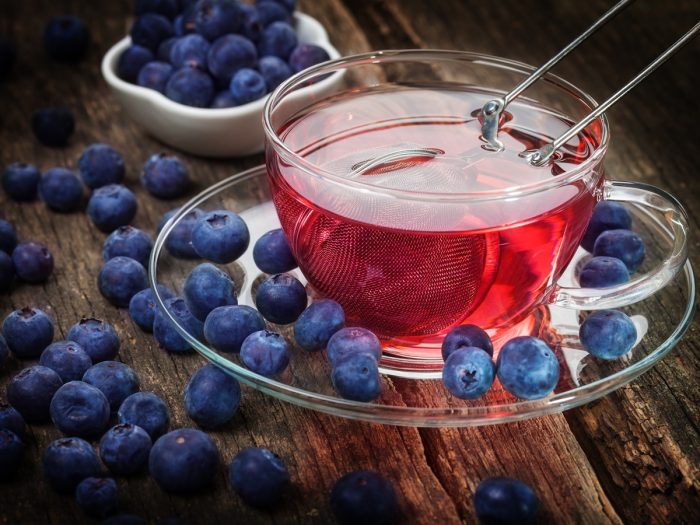Blueberry tea can offer a number of excellent health benefits, which may include its potential ability to strengthen heart health, increase bone density, and boost the immune system. It also helps prevent macular degeneration, improve cognitive function, and improve kidney health.
What is Blueberry Tea?
Blueberry tea is made by steeping the dried leaves of the blueberry bush, as these leaves are packed with antioxidants and nutrients, just like the fruit that the bush bears. Blueberries have become one of the most sought-after fruits in recent decades, after the discovery that they had potent antioxidant potential, and can have a hugely positive effect on overall health. These fruit-bearing bushes are native to North America, but were introduced to Europe nearly a century ago, and can now be found in most parts of the world.
The most common species is Vaccinium cyanococcus, [1]and the majority of its health benefits are derived from the high concentrations of anthocyanins, polyphenolic compounds and other phytonutrients, as well as vitamin A, C, B and K, potassium, manganese, zinc, and iron.
Benefits of Blueberry Tea
Drinking blueberry tea can be a wise choice for anyone experiencing the symptoms of cataracts, low immunity, kidney infections, high cholesterol, hypertension, osteoporosis, low metabolism, nutrient deficiencies, and anemia.
May Boost Heart Health
Blueberry tea can provide a boost to your cardiovascular system in a number of ways, beginning with its possibly high potassium content, which can act as a vasodilator to reduce blood pressure and may lower your risk of atherosclerosis. Secondly, the plausibly high concentration of proanthocyanidins, in blueberry tea, have been shown to help maintain a healthy health. [2]

A fragrant cup of blueberry tea Photo Credit: Shutterstock
May Improve Cognition
The antioxidants found in this powerful fruit tea can significantly affect your cognitive function by preventing oxidative stress and plaque deposition in the brain. This slowing down of your neural connections can be what leads to other neurodegenerative diseases, and the active compounds in blueberries may help protect you from that. [3]
Might Improve Digestion
Gallic acid is a naturally occurring potential antioxidant in blueberries that can reduce inflammation throughout the body, including the stomach. By helping re-balance bacterial levels in the gut, it can optimize digestion, reduce discomfort, cramping and bloating, and ease symptoms of constipation and diarrhea. [4]
May Improve Immune System
Our immune system can be bolstered by both the vitamin C and the anthocyanins found in blueberry tea. Vitamin C stimulates the production of white blood cells and acts as an antioxidant, while the anthocyanins may seek out free radicals and neutralize them before they can cause cells to mutate or undergo apoptosis. [5]
May Aid in Improving Vision
The vitamin A found in blueberry tea means that this herbal beverage can help protect and strengthen your vision. This vitamin is known to act as an antioxidant, specifically in defending against macular degeneration in the retina and slowing down the onset of cataracts. [6]
May Help in Betterment of Kidney Health
Two acids found in this tea, ellagic and hippuric acids, may help detoxify the urinary bladder walls by increasing the acidity of the urine. Furthermore, these active components of blueberry tea can reduce the level of oxalates in the body, which can lead to kidney stones. [7]
May Improve Bone Density
In some studies, consuming blueberry tea has been positively associated with increased bone density and a lower risk of developing osteoporosis. The plausibly balanced mineral content in it may give your body a healthy boost, keeping your bones strong as you age.
May Help In Improving Circulation
Possibly high levels of iron are present in blueberry tea, as is calcium, which can improve iron uptake by the digestive system. Iron is also a key component of red blood cells, which means more oxygenation to extremities of the body and tissues that require repair or regrowth. Improved circulation can also increase energy levels and may prevent symptoms of anemia. [8]
How to Make Blueberry Tea?
Making blueberry tea at home is a simple and quick way to give your body a healthy boost. All you need are blueberries or dried blueberry leaves, hot water and natural sweeteners, such as honey or sugar, if necessary.

Refreshing Blueberry Tea Recipe
Ingredients
- 10-12 blueberries or fresh or frozen
- 2-3 tsp blueberry leaves dried
- 2 cups water filtered
- 1 tsp honey optional
- 1 tbsp cream optional
- 1 tsp sugar optional
Instructions
Blueberry Tea Made From The Fruit
- You will need good quality blueberries for the tea. Wash them well, avoiding any berries that are shrivelled.

- Boil water in a saucepan or a kettle. Steep the berries in the hot water for 10-15 minutes.
- Strain the tea into cups, making sure to mash the boiled berries to get the maximum juice of the fruit.
- Add sugar, honey, or cream if desired. You can also add a green or black tea bag. This blueberry tea can be served hot or iced and makes for a great party beverage!

Blueberry Leaf Tea
- You can buy dried blueberry leaves at most natural health food stores or online. You can also use leaves from wild blueberry bushes. However, before you use wild blueberry leaves, make sure you choose the right leaves as other berry varieties that look similar to blueberries can be hazardous to your health.

- Bring the water to a boil, and then reduce to a simmer. Add the dried blueberry leaves.
- Let the leaves steep for 10-15 minutes.
- Strain the tea and add honey or sugar, if desired.

Side Effects of Blueberry Tea
Blueberry tea has very few side effects, and they are limited almost exclusively to gastrointestinal issues and rare allergic reactions.
- Stomach Issues: The side effects of blueberry tea include stomach upset, indigestion, diarrhea or nausea, but this is only when an excessive amount of this tea is consumed. When consumed in moderation, less than 3 cups per day, these side effects shouldn’t occur.
- Allergic Reaction: While allergic reactions to blueberries are rare, they can happen, and typically manifest as swollen lips, tongue or gums, as well as skin irritation, redness, swelling, and itchiness. If any of these symptoms develop after drinking this tea, discontinue use immediately.
- Pregnancy: If you are breastfeeding or pregnant, always speak to your doctor about your particular condition before adding blueberry tea to your diet.



